May 30, 2025 | 07:47 GMT +7
May 30, 2025 | 07:47 GMT +7
Hotline: 0913.378.918
May 30, 2025 | 07:47 GMT +7
Hotline: 0913.378.918
The "Rice Road" exhibition opened on December 11 in Vi Thanh City, Hau Giang Province, as part of the International Festival of Vietnam Rice Industry- Hau Giang 2023. The event had the theme "Centennial Journey of Vietnamese Rice."
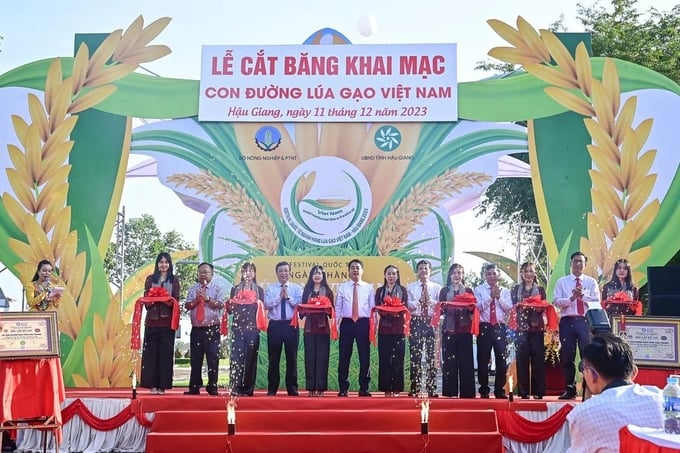
Delegates cut the ribbon to open the Vietnam Rice Road within the framework of the International Festival of Vietnam Rice Industry - Hau Giang 2023. Photo: Trung Chanh.
The exhibition is one of the festival's highlights, including images ranging from historic rice farming recollections to modern practices. The show is held on a one-kilometer-long road that runs alongside the Xa No canal.
The Vietnamese rice map, which introduces various rice types from 63 provinces and cities around the country, is also shown on the road.
The exhibition "Vietnamese Rice Road" took place on December 11th, in the city of Vi Thanh, Hau Giang Province, with the topic "The Thousand-Year Journey of Vietnamese Rice." This is the first event of the International Festival of the Vietnamese Rice Industry - Hau Giang 2023, which is being organized by the Ministry of Agriculture and Rural Development in collaboration with the People's Committee of Hau Giang Province.
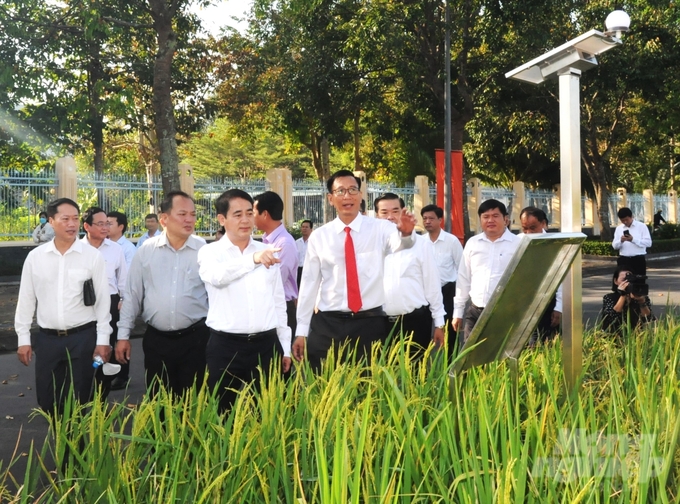
Delegates visited the smart rice farming model with water level monitoring station and automatic pest monitoring, recreated at Vietnam Rice Road. Photo:
The Vietnamese Rice Road has been meticulously arranged and recreated in a vast space at this event, according to the leadership of the Department of Agriculture and Rural Development of Hau Giang, utilizing thousands of rice pots to set the scene, from the germination of green seedlings to the bountiful harvest of golden grains. Farmers' lives have evolved day by day, from thatched buildings, tile-roofed houses, and earthen wall houses to more complex and luxury residences such as wooden houses and multi-story houses, all linked to rice grains.
The modest common fields have grown into enormous, broad fields over time. With this advancement, three-leaf boats, three-panel boats, and cargo ships have been employed to transport rice to far areas both within and outside the country.These scenes have been created along the Rice Road to arouse people's imaginations of rice production practices in each historical period, from prehistoric to present. Images of haystacks, fertile soil, grass, and fields from the homeland's rural fields have evolved here, conjuring the image of farmers from the ground to technology-assisted productivity. The models for cultivating wet and dry rice have been constantly evolved, boosting the brand with machinery, technology, and unmanned aerial vehicles," stressed Hau Giang's agriculture sector leadership.
The resurrection rice route is especially important at the historical Xa No Canal, which is regarded the biggest rice transportation hub and reserved of the Cochinchina. The Xa No canal is a historic site associated with the opening of a large agricultural tract in Hau Giang. The canal connects the Hau River's fresh water and alllumivia to consolidate and irrigate the horizontal paddies.
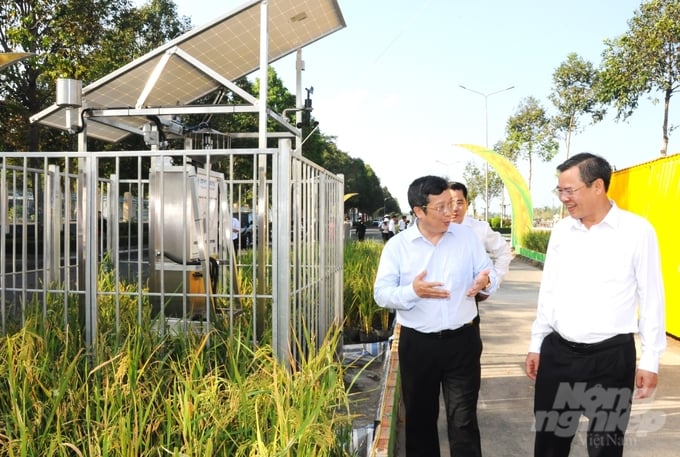
Deputy Minister of Agriculture and Rural Development Hoang Trung (left) and Vice Chairman of Hau Giang Provincial People's Committee visit the Vietnam Rice Road. Photo: Trung Chanh.
On the canal, barges and boats transport rice from Hau Giang to Can Tho, Sai Gon, and other locations. Since the construction of the Xa No canal, Vietnam's rice export output has steadily increased, and the country has become the bustling "rice road" of the Southwest. After 120 years of formation and development, Xa No still plays an important role in Mekong Delta agricultural output in general, and rice production in particular.
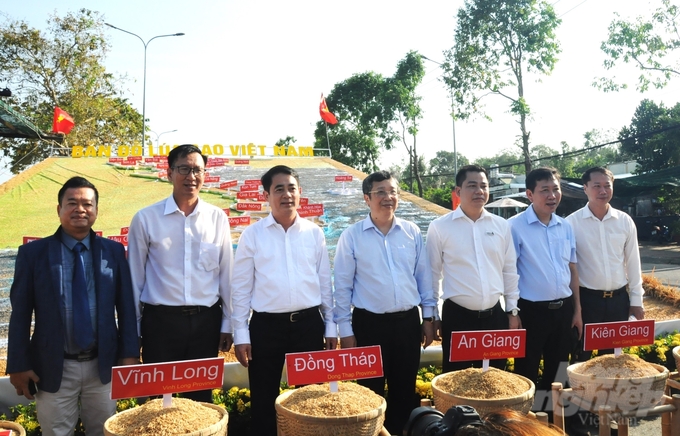
Leaders of the Ministry of Agriculture and Rural Development and delegates visited the Vietnam rice map displayed at the Rice Road. Photo: Trung Chanh.
The Rice Road has been precisely prepared and recreated inside a huge space at this event, with tens of thousands of rice pots setting the scene, portraying the journey from the sprouting of green seedlings to the rich harvest of golden grains. Farmers' daily life have evolved in tandem with these rice grains, from thatched dwellings, earthen-wall houses, and tiled-roof houses to more durable and luxury constructions like as timber houses and multi-story residences. Local communities' tiny common fields have grown into large, expansive pastures over time. Boats with three leaves, three-panel boats, cargo ships, and other vessels have been used in this succession to transport rice to far areas both within the country and beyond.
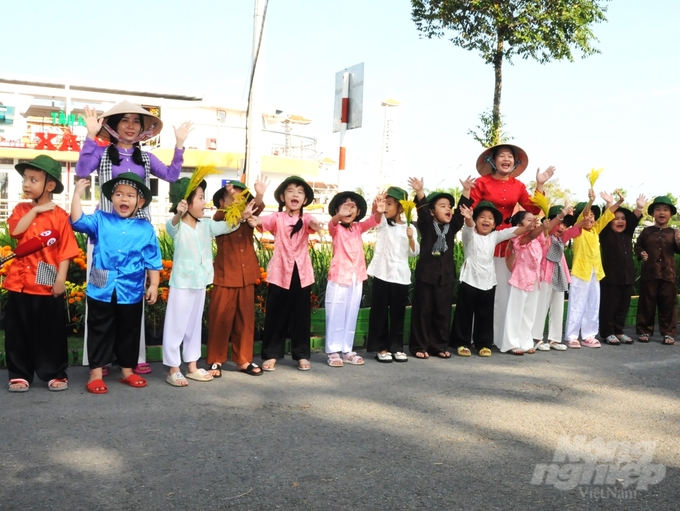
Hau Giang students enjoyed being led by the teachers to experience and visit Vietnam's rice roads. Photo: Trung Chanh.
The Vietnamese Rice Road shines brightly as it sets new records. In particular, in the first ten months of 2023, the country exported 7.1 million tons of rice, earning about 4.7 billion USD. The export price of Vietnamese rice is rapidly rising, approaching the world's highest tier. Vietnamese rice has been consistently recognized as the best in the world. The Vietnamese rice industry's position is being solidified and raised like never before.
A map of Vietnam, constructed of distinct rice varieties representing each of the 63 provinces and cities, has been set along the Rice Road in honor to the esteemed rice varieties that have contributed to the millennia-long agricultural civilization. This one-of-a-kind method is a creative way of promoting the Vietnamese Rice brand around the world.
Translated by Linh Linh

(VAN) Ms. Nguyen Thi Dung, Deputy Director of Ngoc Hoang Cooperative, shared about the journey of bringing dragon fruit to Europe, achieving annual revenues in the billions of VND.

(VAN) Bamboo products from Thang Tho Bamboo Cooperative have reached many countries around the world, while also creating jobs for local workers.

(VAN) The Management Board of Con Dao National Park reported that a green sea turtle, tagged in the Philippines, has traveled thousands of kilometers to lay 84 eggs on Bay Canh Islet.

(VAN) Green technology is paving a new path for sustainable aquaculture in the Mekong Delta in particular and across the country in general, helping reduce emissions and adapt to climate change.

(VAN) On May 27, La French Tech Vietnam (the French startup and innovation community in Vietnam) held the French Tech Summit Vietnam 2025.
/2025/05/27/4731-2-223159_980.jpg)
(VAN) No votive paper, no styrofoam, no plastic bags, no plastic bottles, and no single-use plastic trays are the key rules tourists should keep in mind when visiting Con Dao.

(VAN) In the fight against plastic pollution, Vietnam has been demonstrating a proactive, pioneering, and active role in addressing the greatest environmental challenge today.